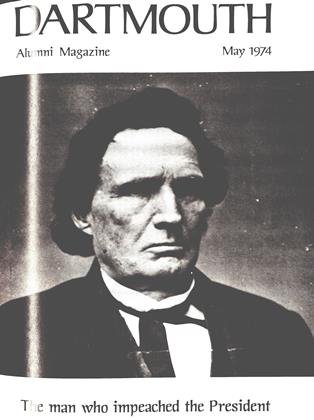ALFRED LORD TENNYSON: IN MEMORIAM. AN AUTHORITATIVE TEXT, BACKGROUND AND SOURCES, CRITICISM.
May 1974 JOHN HURD'21ALFRED LORD TENNYSON: IN MEMORIAM. AN AUTHORITATIVE TEXT, BACKGROUND AND SOURCES, CRITICISM. JOHN HURD'21 May 1974
Selected and edited by RobertH. Ross '38. New York: A Norton CriticalEdition, 1973. 261 pp. Hardback $8.95. Soft-back$1.95.
In Tennyson (1923) Sir Harold Nicolson suggested that the Nicolsonian times were to.o close to the poet's for objective appraisal. Ross now attempts it. With 14 other literary historians and critics he has indeed not attempted to portray the whole Tennyson, but evaluations of the famous elegy, felicitously updated, focuses on essentials. Succinct yet full, the Ross book is suited for the general reader interested in bereavement and adjustment; for literary persons curious about poetic architectonics and thematic patterns; for the historically minded about the glow and afterglow of the Victorian midday and twilight and year-by-year developments in Tennyson's life; for unskilled readers baffled by obscure lines and references; and for teachers at all levels from high school to graduate school. A former English professor at universities in Ohio and Washington State, now a rare-book specialist in Hanover, Ross, well qualified as a Tennyson scholar, for years has taken advantage of the excellent Victorian collections in the Dartmouth College Library.
Neatly tucked in on page bottoms and aimed at the 20th century reader, his notes identify Tennyson's allusions, supply biographical and historical information, paraphrase obscure passages, and occasionally serve as cross references. A brief Ross essay, "The Three Faces of In Memoriam," summarizes traditional critical approaches and alerts the reader to critical assumptions in other essays. One hundred and sixty-eight pages are given to background commentators, essayists, critics, and bibliographies. Basil Willey: Neither local nor ephemeral, the 'problems are universal among sensitive and meditative minds. T.S. Eliot: Tennyson has the three qualities found only in the greatest poets: abundance, variety, and complete competence. Carlisle Moore: Despite Tennyson's employment of Victorian concepts, he conveys successfully the mystical quality of his own vision and experience. A.C. Bradley: Internal chronology determines the structure. Paull F. Baum: In Memoriam lacks clarity and sureness of treatment. John D. Rosenberg: In 100 years following publication no poem more daring, persuasive, or eloquent exists. E. D. H. Johnson: Bridging earlier and later work, In Memoriam is surely as much testament to artistic as to philosphic growth. Jerome Buckley: The poem anticipates the serious debate that Darwinism in particular and Victorian science in general would provoke. Clyde de L. Ryals explores theme and symbol, and Alan Sinfield relates the language of modern poets to Tennyson's.
Ross proves himself marvellously able in the 1973 critical environment so different from the 1921 in Lytton Stracheys' ironic biography of Queen Victoria, who told Tennyson after the death of the Prince Consort that next to the Bible In Memoriam was her greatest comfort.
 View Full Issue
View Full Issue
More From This Issue
JOHN HURD'21
-
 Class Notes
Class Notes1921
April 1976 By HAROLD F. BRAMAN, G. HARRY CHAMBERLAINE, JOHN HURD'21 -
 Books
BooksFIRST PERSON: CONVERSATIONS ON WRITERS AND WRITING WITH GLENWAY WESCOTT, JOHN DOS PASSOS, ROBERT PENN WARREN. JOHN UPDIKE. JOHN BARTH, ROBERT COOVER
March 1974 By JOHN HURD'21 -
 Books
BooksMASTER OF THE COURTS.
May 1974 By JOHN HURD'21 -
 Books
BooksThe Eye of the Beholder, Squinting
April 1975 By JOHN HURD'21 -
 Books
BooksMetals and Living Flesh
March 1976 By JOHN HURD'21 -
 Books
BooksFields of Grace
September 1976 By JOHN HURD'21
Books
-
 Books
BooksAN INTRODUCTION TO ECONOMIC REASONING.
June 1956 By BRUCE W. KNIGHT -
 Books
BooksTHE RECOVERY OF MYSELF.
June 1931 By C. N. Allen -
 Books
BooksTHEATERS AND AUDITORIUMS
July 1949 By George W. Schoenhut -
 Books
BooksREVOLUTIONARY NEW HAMPSHIRE: AN ACCOUNT OF THE SOCIAL AND POLITICAL FORCES UNDERLYING THE TRANSITION FROM ROYAL PROVINCE TO AMERICAN COMMONWEALTH
October 1936 By Herbert W. Hill -
 Books
BooksCHAUCERIAN ESSAYS.
February 1953 By HEWETTE E. JOYCE -
 Books
BooksThe Drifting Home,
FEBRUARY, 1927 By Ralph P. Holben
JOHN HURD'21
-
 Class Notes
Class Notes1921
April 1976 By HAROLD F. BRAMAN, G. HARRY CHAMBERLAINE, JOHN HURD'21 -
 Books
BooksFIRST PERSON: CONVERSATIONS ON WRITERS AND WRITING WITH GLENWAY WESCOTT, JOHN DOS PASSOS, ROBERT PENN WARREN. JOHN UPDIKE. JOHN BARTH, ROBERT COOVER
March 1974 By JOHN HURD'21 -
 Books
BooksMASTER OF THE COURTS.
May 1974 By JOHN HURD'21






